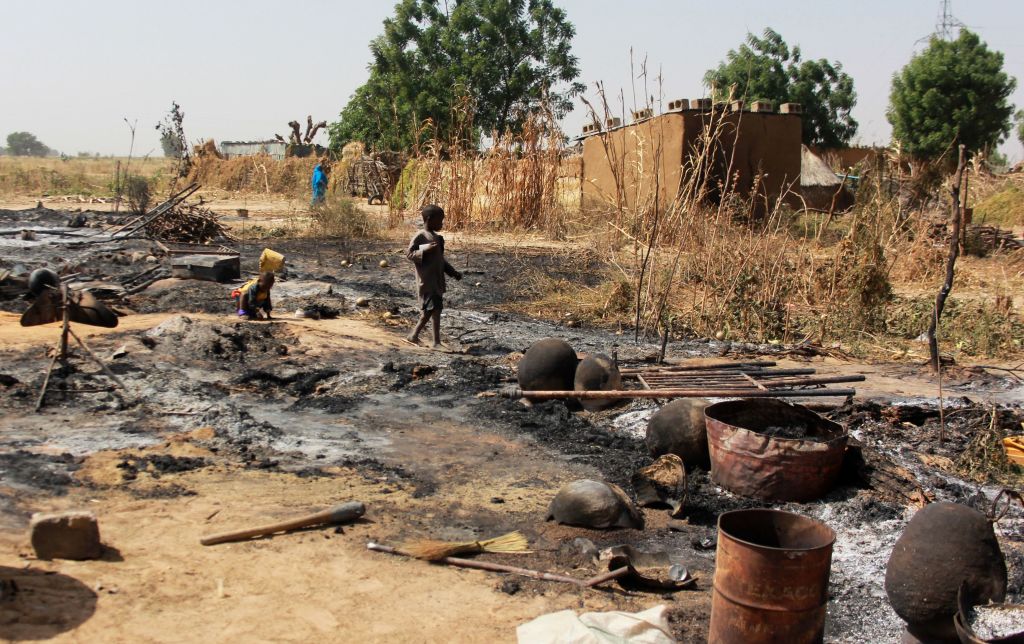Boko Haram Kidnappings Signal Expansion, Desperation
ADF STAFF
The masked men from Boko Haram entered the village of Shiroro in Nigeria’s Niger State from the nearby Hudawa forest. They fired their weapons as they made their way along Shiroro’s dirt roads.
As some members of the group held the villagers at gunpoint, others went house to house, kidnapping the village’s children. The boys would be enlisted as child soldiers; the girls would be married to Boko Haram fighters.
From its origins in Nigeria’s Borno State, Boko Haram has spread its brand of violent extremism across northern Nigeria and the Lake Chad region. Its appearance in Niger State represents an expansion south and west.
“I am confirming that there are Boko Haram elements here in Niger State,” Abubakar Bello, governor the neighboring Federal Capital Territory, told Nigeria’s Premium Times. “I am confirming that they have hoisted their flags here.”
Experts say the kidnappings are a response by the terror group to recent losses. More than 52,000 Boko Haram fighters have surrendered to authorities. Nearly 50, including two commanders, surrendered to the Nigerian military in November. Fighting between Boko Haram’s two factions — Jama’tu Ahlis Sunna Lidda’awati wal-Jihad (JAS) and the Islamic State West Africa Province (ISWAP) — has further reduced both groups’ ranks.
The kidnappings have become a way for both groups to rebuild their forces, according to Malik Samuel, a researcher with the South Africa-based Institute of Security Studies (ISS). It also represents an important change in tactics for ISWAP, which broke away partly because it opposed recruiting boys and kidnapping girls.
“One would expect ISWAP to act differently,” Samuel wrote for ISS in 2022. “But recent losses of fighters in battle, clashes with JAS, and members’ desertion may have compelled it to rethink its stance on child soldiers.”
When Boko Haram fighters arrived in the Niger State community of Kurebe, one of their first acts was to set fire to the new local school. The group has made destroying schools a key part of its recruitment efforts.
Kurebe chieftain Yusuf Saidu said the terrorists gave residents an ultimatum before destroying the school.
“They issued threats to us that they would kill us and our children if we send them to school,” Saidu told the Premium Times. Parents kept their children out of school, he said.
“They abduct our children and say they are putting them in their schools,” he said. “We don’t know where the school is, but we know they said we shouldn’t take our children to the school here in Kurebe. Anyone that wants his children to go to school must take them outside the village.”
UNICEF estimates that Boko Haram has kidnapped more than 8,000 boys and girls since 2009. In that same time, it has destroyed 5,000 classrooms and nearly a million homes.
“It is unacceptable and unconscionable that girls and boys continue to serve on the frontlines of a conflict they did not start,” Phuong T. Nguyen, UNICEF’s representative in northeastern Nigeria, said in a statement.
UNICEF has called upon Nigeria to join its Handover Protocol to ensure that freed child soldiers are turned over to civilian authorities to be reintegrated into society and reunited with their families.
“We owe girls and boys a chance to leave the horrors of conflict behind,” Nguyen said. “Every day of delay in the custody of armed groups is a tragedy with grave implications for the children, families, and Nigerian society as a whole.”
Nigeria has joined other international efforts to prevent the recruitment of child soldiers. Borno State, where Boko Haram originated, approved a measure last year banning sexual abuse of children along with the use of children as soldiers and laborers — a measure directed at Boko Haram.
In areas where the group has sway, young children are put to work in the fields while boys go to training camps where they learn to handle weapons and are indoctrinated as fighters. Young girls are taken as wives by Boko Haram fighters.
Haruna Husaini’s 11-year-old daughter, Rumasau, was among the girls kidnapped during the raid on Shiroro. He begged the terrorists to return her. They offered to pay her bride price instead.
“They said we should talk about her dowry, but I refused to collect it,” Husaini told the Premium Times. “I told them I just want my daughter.”


Comments are closed.